
The Regents’ Medal for Excellence in Teaching is awarded by the Board of Regents as tribute to faculty members who exhibit an extraordinary level of subject mastery and scholarship, teaching effectiveness and creativity and personal values that benefit students.
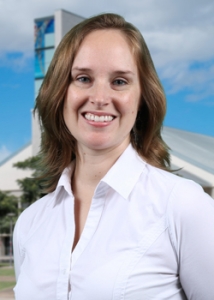
Jennifer Byrnes joined the faculty at the University of Hawaiʻi–West Oʻahu as an assistant professor in the social sciences division in fall 2014. She describes her teaching philosophy like learning to fish.
Byrnes says “like fishing, learning takes patience and work, but it can also be fun and it should be fulfilling.”
According to Byrnes, “Students demonstrate meaningful learning when they use critical thinking about new information to solve problems or to reach an answer independently.” She sees her role as part coach and part facilitator.
One student commented in an evaluation, “The thing that impressed me the most about (Professor) Byrnes is that she is willing to spend her time out of the classroom to assist and guide you in your own career, regardless if you are her student or not.” Another student reported, “I enjoy her lectures because it feels like a two way discussion, and she’s always communicating with the class instead of at the class.”
Outside the classroom, Byrnes serves as a member of the Institute of Engaged Scholarship committee at UH West Oʻahu.
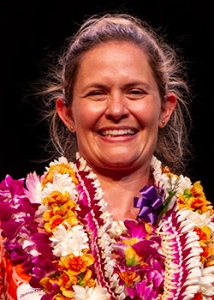
Jennifer Darrah-Okike is an assistant professor in the Department of Sociology in the University of Hawaiʻi at Mānoa’s College of Social Sciences. She states that “serving as a faculty at UH Mānoa is the great privilege of my life. Students are a major reason.”
Her students hear that message loud and clear and return it with heart-felt reciprocity, saying, “Professor Darrah is hands down my favorite instructor” and “She really cares about us and has brilliant insight that helps us understand.”
Darrah-Okike grounds her practices in theories of multiple intelligences and the effectiveness of visual and kinesthetic classroom activities, and engages in place-based teaching and learning. Her colleagues are proud to have her as a member, as a “true asset to the department who has made a significant contribution to our teaching in areas of theory, urban sociology, race/ethnicity, culture and identity.”
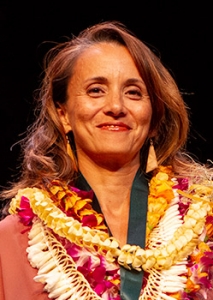
Noelani Goodyear Kaʻōpua of the Department of Political Science in the University of Hawaiʻi at Mānoa’s College of Social Sciences grounds her practices in the principles of: cooperative learning, ongoing assessment of herself and her students, place-based and service-learning approaches, and being globally-connected and indigenous-serving.
Her model for the Nā Koʻokoʻo program has led to transformational experiences for students, providing opportunities for them to study social sciences through Kanaka Maoli perspectives, seamlessly weaving visual and written elements, intersecting multiple disciplines, and merging academic scholarship with community labor. One student said, “This program was life-changing, I will forever be inspired.”
Goodyear Kaʻōpua views teaching, research and service as intertwined “to form a durable rope to pull ourselves closer to our goals and communities beyond the campus.” She extends this belief system to students, envisioning them as they practice building their own ropes of understanding.
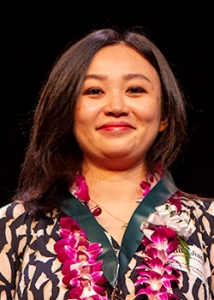
Li Jiang of the Department of East Asian Languages and Literatures in the University of Hawaiʻi at Mānoa’s College of Languages, Linguistics & Literature, demonstrates genuine passion for teaching, a strong ability to translate her specialized knowledge of the field of syntax and semantics, and tremendous versatility in classroom teaching and serving on numerous dissertation committees in her own department and others.
Her colleagues and students recognize her as a devoted, engaging teacher with the ability to connect students’ prior content knowledge with new content knowledge to facilitate their learning. A colleague who has observed her teaching and classes describes her teaching as “highly organized, efficient, passionate and energetic, and her classes are exceptionally informative, inspiring, engaging, creative and interesting.”
Jiang’s touchstone in teaching is based on Confucian wisdom: to reach beyond the pursuit of knowledge, beyond being interested in knowing, to the higher goal of deriving delights from learning.
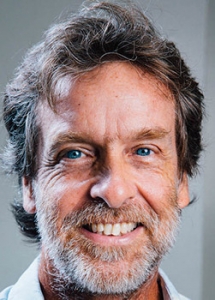
Philip Johnson is a professor in the Department of Information and Computer Sciences in the University of Hawaiʻi at Mānoa’s College of Natural Sciences. He has initiated a higher performance learning environment he calls “Athletic Software Engineering,” based on his experience as a competitive outrigger canoe paddler and CrossFit member. Students achieve competency by performing timed “workouts” on real-world systems they have built, enabling them to solve problems correctly and quickly.
Johnson offers students a unique challenge—consistent, team-based, fast-paced, results-oriented project work like they can expect in a real software-development setting.
Alumni report that his courses were the most useful to them in their subsequent work in the community. A former student expressed a “deep respect for Johnson due to his extensive knowledge, his unapologetically intense enthusiasm for teaching, his endless devotion to his students and his infectious passion for constant innovation.”
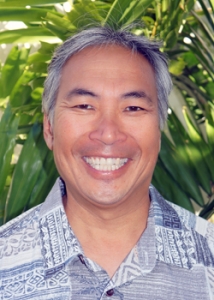
Mark Sung Alapaki Luke is an assistant professor at Honolulu Community College. When asked about this gifted and well-loved teacher, students speak about his “extraordinary aloha,” “unwavering dedication to higher education,” and “vast knowledge of the Hawaiian culture.” They appreciate and deeply feel that he “wants students to learn,” “motivates [them] to think critically about society” and encourages them to “share their opinions and express themselves.”
One student remarked that what makes this professor’s teaching so extraordinary is that it “comes from a place of passion, pain, but also hope.” Passion because he cares deeply about his subject, pain because that subject deals with a long history of discrimination and dispossession experienced by Native Hawaiians, and hope because of his sustained commitment to build a future for Hawaiʻi based on the principles of fairness, equity and empowerment.
Among colleagues, this kumu is respected for his commitment to the campus community demonstrated in his sustained efforts to perpetuate the Hawaiian culture and empower Native Hawaiian students. Luke’s leadership and advocacy have been critical to the success of projects aimed at indigenizing the campus, including the creation of the AA degree in Hawaiian studies, the expansion of the Hawaiian Center, construction of the campus hale and the building of the malo.
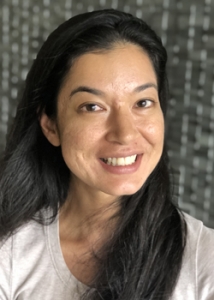
Audrey Mendoza is an assistant professor of speech at Windward Community College. “If you’re not having fun, you’re not doing it right,” is Mendoza’s philosophy of teaching. She exemplifies Windward CC’s commitment to excellence and supporting students and is always there to meet students where they’re at, while keeping standards high. Her students are known to participate in meaningful discussions in class and take part in debate club activities outside of class. One student learned from Mendoza that “life begins at the edge of your comfort zone.”
Her commitment to Windward CC goes beyond her teaching. She has developed the Speech Lab into a well-oiled machine that provides support to students. Students from other campuses come to the lab to prepare, practice and perform presentations and speeches. She formed the first-ever Windward CC Debate Club, which produced a championship team in its first year of competition at UH Mānoa, then established Windward’s own debate tournament.
Mendoza holds a master’s degree in speech from UH Mānoa, and has been teaching at Windward CC since 2011. Her peers have respect and admiration for her teaching, and one said, “I believe that her future work and contributions will be many and substantial.”
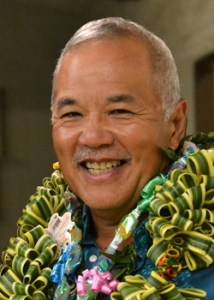
Lew Nakamura is an agriculture instructor at Hawaiʻi Community College, who has been lauded by his colleagues for his “student first” philosophy, his gift for inspiring students, his positive attitude and his strong work ethic.
Nakamura believes hands-on, project-based instruction methods work best in the field of agriculture and help students retain knowledge as they apply what they have learned. One colleague wrote that Nakamura’s “commitment to his students, program and our educational institution goes far beyond what is expected of any instructor!”
He has been an agriculture instructor at Hawaiʻi CC since 2015. Prior to joining Hawaiʻi CC, he acquired 34 years of experience in the agriculture and landscape industries, including the United States Department of Agriculture Soil Conservation Service, as grounds superintendent at the Sheraton Maui Hotel and as owner of Hikari Nursery and Landscaping. He holds a bachelor’s of science degree from the University of Hawaiʻi at Hilo.
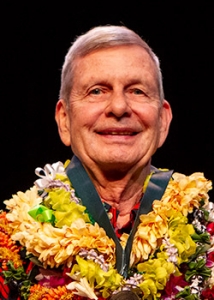
James Pietsch, a professor at the University of Hawaiʻi at Mānoa’s William S. Richardson School of Law, is a recognized expert at the intersection of law, aging, health care and bioethics. He teaches courses that intersect with the Center on Aging, School of Nursing and John A. Burns School of Medicine. His preferred methods of engaging students include rhetoric, dialogue and the Socratic Method.
Pietsch enables students through innovative, experiential “clinics” that cannot be replicated in a textbook or classroom. In clinic, students confronted with realities of poverty, loneliness and concerns facing many people with disabilities in our community learn the value an attorney may extend well beyond the practice of law.
His own sustained commitment to bringing university expertise to community contexts is so manifest, so embedded in his teaching, that upon leaving UH on highly diverse professional paths, considerable numbers of Pietsch’s students are inspired to replicate those practices as their own.
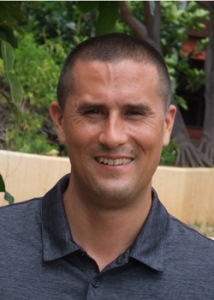
Mike Ross is an instructor of math and sciences at Kapiʻolani Community College. When he moved to Hawaiʻi 16 years ago, he developed a keen interest in ethnobotany and how the early Hawaiians used plants to sustain their lifestyle. He earned his BS and MSc degrees in botany from the University of Hawaiʻi at Mānoa.
His teaching philosophy is to actively engage students in the process of learning by connecting classroom content to pressing civic and bio-cultural issues. To achieve this, he uses an interdisciplinary approach to teaching and incorporates mālamaʻāina practices into the learning experience. He believes having students work directly with the ʻāina (earth) allows students to respect and sustain life. Ross says, “And the beautiful thing about this kind of learning is that no one can take it away from you.”
Ross says knowing some of his former students are now in graduate school, “is one of the greatest highlights of my career.”
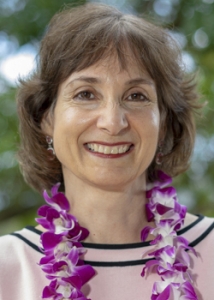
Suzette Scotti is an assistant professor of art history at Leeward Community College. She is passionate about making art history “relevant and relatable.” She travels extensively to photograph art around the world and shares her first-hand accounts with her students.
Scotti’s teaching style is warm, smart and engaging. She is committed to the student’s success; offering to counsel students on many topics and sending email reminders about due dates and tests. Scotti has also written dozens of recommendation letters for students, many of whom have received scholarships.
Outside of class, Scotti is a docent at the Honolulu Museum of Art and a member of the Jewish Film Festival Committee. She earned her master’s certificate in art crime and cultural heritage protection from the Association for Research into Crimes Against Art in Amelia, Italy. Scotti has published several articles in the Journal of Art Crime.
Scotti is serving her second two-year term in the faculty senate, is the chair of the Arts and Humanities Division Personnel Committee, and serves as co-chair of the General Education and Foundations Committee. She helped create the Global Studies Certificate Program and is a judge for History Day competitions.
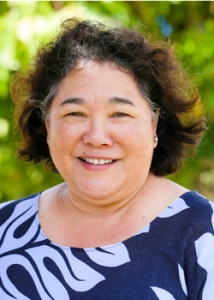
Candace Tabuchi is an associate professor of business at Kauaʻi Community College. Her professional life includes a visitor industry career spanning more than 24 years. Starting at Kauaʻi CC, she earned her AA, then her BBA at UH West Oʻahu, and her MBA at UH Mānoa from the Shidler College of Business. Tabuchi has been teaching at Kauaʻi CC since 2006.
Tabuschi said, “I seek to equip, not enable students. I am but one stepping-stone along their journey, and I endeavor to make my step one that is stable, progressive, and tangible for students. The hospitality industry reflects many of the values of our host culture, the Hawaiian culture. The concept of kuleana requires teamwork, communication, standards of excellence, mentorship, accountability, empowerment, respect, and most importantly, the aloha spirit. These values are key for success in our visitor industry. I transition these cultural values, these industry standards, into my teaching philosophy.”
Her student said, “Ms. Tabuchi shows up every day with a contagious smile and an eagerness to teach us. She is committed not only to teaching, but to making a difference in her students’ lives and futures. It’s clear to us, her students, that this is more than just a job to her. We are not just a class with Ms. Tabuchi as our instructor, we are ʻohana.”
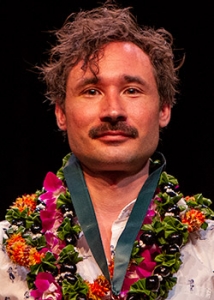
Lance Walters is an assistant professor in the University of Hawaiʻi at Mānoa School of Architecture. As a practicing professional architect who brings both passion and compassion to his teaching, students learn to be exceptional designers knowing full well that they will be challenged to produce their best work under his tutelage.
Students remark on his investment in their well-being, naturally seeing the best in them, while expressing values of education, importance of being a global citizen and expanding awareness and setting high expectations for oneself.
Walters communicates the significance of cultural values and a unique sense of place, articulating the importance of his connections to family and to landscape through the lens of his indigenous heritage. He has generated collaborative design projects that reach the community, providing opportunities for students to extend classroom skills to direct and impactful purpose in the context of community and campus.

Supakit Wongwiwatthananukit is a professor at the the University of Hawaiʻi at Hilo Daniel K. Inouye College of Pharmacy (DKICP). Dr. Supakit, as he is fondly known to students, has played a key role in the college of pharmacy since 2008.
He helped to develop at least seven didactic and experiential courses within the PharmD and PhD programs, serves as a faculty and academic advisor for PharmD students and numerous DKICP student organizations, including A Life of Health and Awareness (ALOHA) project, the Pacific Islander mobile screening clinic, the Rho Chi Delta Iota Chapter Academic Honor Society, and is a preceptor for the Journal Club. He is committed to creating a learning environment that embraces respect, openness and creativity, and takes every opportunity to help his students grow and develop to be effective and caring professionals.
He is currently collaborating with colleagues in pharmaceutical sciences on research projects involving drug discovery and the development of natural products as potential anticancer agents.
One of Wongwiwatthananukit’s most notable contributions was preparing and overseeing the creation of the college’s accreditation process and report during 2016–2017. He developed the self-study report that is the basis for the college’s reaccreditation from the Accreditation Council for Pharmacy Education.
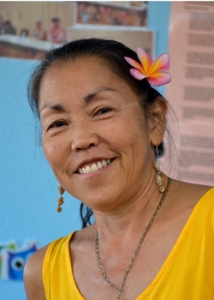
Elaine Yamashita is a professor in the University of Hawaiʻi Maui College’s Department of Social Sciences. Yamashita’s role in developing UH Maui College’s early childhood program was instrumental in bringing the Head Start facility on campus, which provides care for 3- to 5-year-old keiki of UH Maui College students from low-income families. The facility also provides hands-on training for Yamashita’s early childhood program students.
She joined the college in 1992, bringing with her more than a decade of experience in childhood education. Yamashita rose to program coordinator in 1999 and then served in leadership positions in state and national boards governing policy and development of education for young children. Her passion with children is evident in her work throughout the years.
As a proud product of Maui’s public education system, Yamashita’s legacy is to ensure quality training and compensation is available to those in the field of early learning “so that they can continue to make early childhood education programs better for all our keiki and their ʻohana.”

